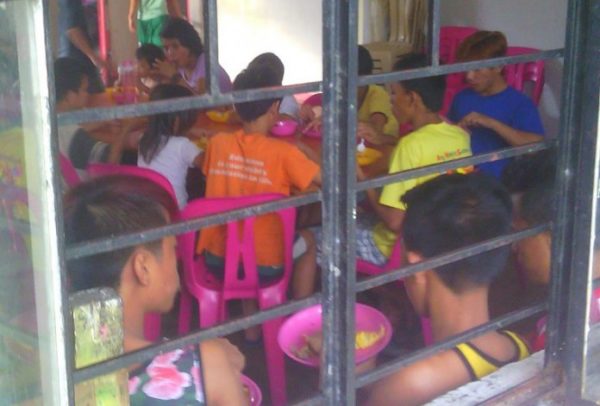House resetting age of child who can be prosecuted for crime
November 23, 2016 · By Concept Central for conceptnewscentral.com

A detention center for minors in Malabon City. (Bahay Sandigan photo)
Under the law, a child who commits a crime can only be prosecuted if he or she is at least 15 years old. But previously, the minimum age of criminal responsibility was nine years old under the Revised Penal Code of 1930. Now, with the rising number of crimes committed by children under 15 years old, lawmakers want to revert to the 1930 law.
The House sub-committee on correctional reforms recently opened discussions on six bills seeking to lower the age of criminal responsibility from 15 to nine years old.
Rep. Henry S. Oaminal (1st District, Misamis Occidental), committee chairman, expressed hope the sub-committee would be able to discuss exhaustively the issues involving children in conflict with the law and come up with necessary legislation more responsive to the needs of the times.
Oaminal discussed the legislative history of allowing a minimum age of criminal responsibility, citing the following: Revised Penal Code of 1930, which set the minimum age of criminal responsibility to nine years old; Republic Act 9344, otherwise known as the “Juvenile Justice and Welfare Act of 2006,” which raised the minimum age to 15 years old; RA 10630, which amended RA 9344, but retained the minimum age of 15 years old.
During the 16th Congress, Oaminal said, bills were filed to amend RA 9344 to lower the minimum age of criminal liability from 15 to 12 years old.
This 17th Congress, Speaker Pantaleon D. Alvarez and Deputy Speaker and Capiz Second District Rep. Fredenil H. Castro filed House Bill No. 2 seeking to revert the minimum age of criminal responsibility to nine years old from 15.
The House leaders said that setting the age of criminal accountability to 15 years old has resulted in “the pampering of youth offenders who commit crimes knowing they can get away with it.” They said criminals make use of youth below 15 years old to commit crimes, such as drug trafficking, knowing that children below 15 years old cannot be held criminally liable.
Moreover, children nine years old and above in this age of internet and digital media are already fully informed and should be taught that they are responsible for what they say and do, they added.
During the hearing, Reps. Mercedes Cagas (Lone District, Davao del Sur) and Romeo Acop (2nd District, Antipolo City), authors of House Bills 1609 and 2009, respectively, and Castro manifested that the explanatory note of their respective bills be adopted as their sponsorship speeches.
Those who gave their views were representatives from the Department of Social Welfare and Development (DSWD), Department of Justice (DOJ), Commission on Human Rights (CHR), Philippine National Police (PNP), National Bureau of Investigation (NBI), Public Attorney’s Office (PAO), Juvenile Justice and Welfare Council (JJWC), Philippine Legislators Committee on Population and Development (PLCPD), United Nations International Children Emergency Fund (UNICEF)-Philippines, Philippine Action for Youth Offenders (PAYO), Salinlahi Alliance for Children’s Concerns (Salinlahi), Humanitarian Legal Assistance Foundation (HLAF), and other non-government organizations (NGOs).
The PNP and the NBI support the lowering the age of criminal responsibility and proposed that it be made 12 years old from the present 15.
Castro, Cagas, Reps. Edward Maceda (4th District, Manila), and Vincent Crisologo (1st District, Quezon City) manifested that Social Welfare and Development Secretary Judy Taguiwalo should be present at the next hearing to give her stand on the proposals.
Cagas said the contrary position taken by some agencies and NGOs to the bills has been noted. She emphasized that her objective in filing HB 1609 was to protect the interest of children.
Cagas said her proposal would deter the prevalence of crimes committed by minors and protect the children from exploitation by crime syndicates.
Castro suggested to the sub-committee to invite representatives from the Department of Education (DepEd) and League of Barangays of the Philippines in the next meeting.
Crisologo said the sub-committee should also invite other religious organizations, such as the Iglesia Ni Cristo (INC).
The Catholic Bishops Conference of the Philippines (CBCP) has already submitted its position paper on the bills.
Rep. Arlene Brosas (Party-list, Gabriela) requested that invitations be extended to the Department of the Interior and Local Government (DILG), Local Council for the Protection of Children, Barangay Council for the Protection of Children, and the Psychological Association of the Philippines to also provide guidance to the lawmakers.
Brosas said Gabriela strongly believes that children are victims, not criminals, as they face problems of poverty, lack of education, and forced child labor.
The government should ensure children’s access to basic social services and not prosecute them according to Brosas. “It should prosecute criminals who lure children to commit crimes and should ensure full implementation of the Juvenile Justice and Welfare Act (JJWA),” she said.
Oaminal instructed the committee secretariat to send the invitations to the abovementioned agencies and organizations.






